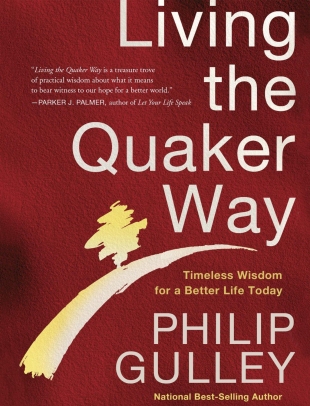Philip Gulley is a Quaker pastor and author of 15 books with combined sales exceeding 1.5 million copies. His spiritual journey as a Quaker began in 1977 and since then he has been involved in six Quaker meetings, serving five of them as a pastor. He calls this path a "transformative pilgrimage."
In this solid and substantive book, Gulley examines the essential Quaker testimonies which are easily remembered by the acronym of SPICE — simplicity, peace, integrity, community, and equality. Although the Religious Society of Friends is not growing by leaps and bounds, its central focus on the importance of the inner life has been taken to heart by many who see this focus as "an antidote to the complexities and challenges of modern life."
Gulley concludes the introduction with a confession: "My interest is not in growing the Quaker denomination. My passion is in growing a world in which peace, love, and justice reign. In the end, I am not inviting you to a church, but to a life."
The author begins with a salute to the spiritual practice of simplicity which is an alternative to the American emphasis on success and the idea that a winner is someone who has accumulated possessions and wealth. Gulley discusses the hallmarks of the simple life: awareness, generosity, patience, persistence, and focus. He has discovered in the later stages of his life that paring down both the number of possessions and mental distractions is part and parcel of what the Quakers mean by "centering down." True wealth comes not only from "learning to live with less but also learning to want less."
In a hard-hitting chapter on the spiritual practice of peace, Gulley suggests that we view violence and war as diseases which we must develop cures for as soon as possible. He also suggests that the continued manufacture of weapons of mass destruction be considered as crimes against humanity. This passion for truth-telling is another one of the hallmarks of the simple life under the umbrella of integrity. In their quest for meaning, Quakers are willing to open their hearts and minds to the values and visions of other faiths and spiritual paths.
In the chapter on community, Gulley notes that behind every saint is a community that "honed their faith, clarified their thoughts, tested their resolve, and provided support." The author hopes that religious communities of the future will be more accommodating to differences of opinion and to the emerging wisdom of the contemporary scene.
Equality lies at the heart of the Quaker search for truth. Sadly enough, Gulley observes, religions have a shadow side which has not been supportive of God's preference for the poor, the enactment of the Golden Rule in our working lives, or the rejection of the gap between the rich and the poor. "To live the Quaker way is to scorn injustice and reject self-interested privilege."
Be sure to check out Gulley's thirty-day spiritual practice that applies the Quaker tradition of Queries.
